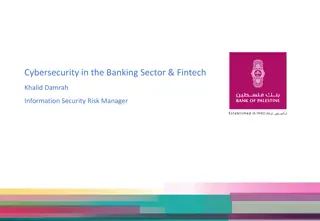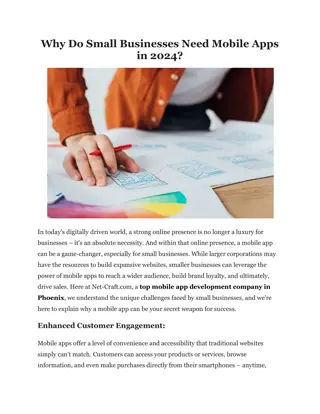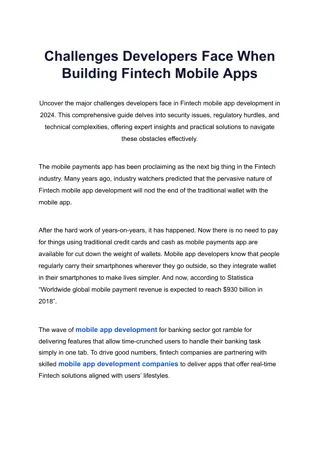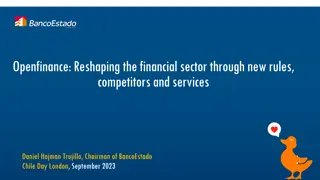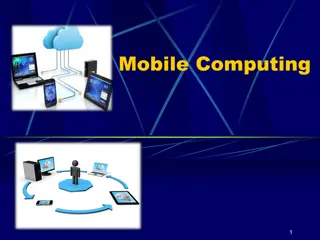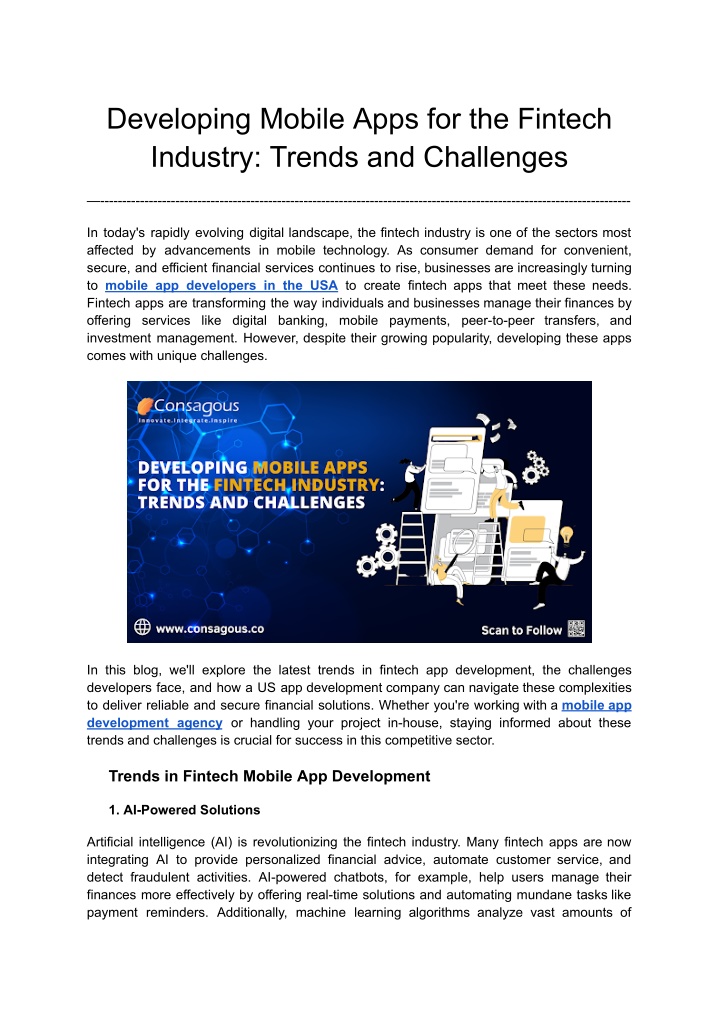
Developing Mobile Apps for the Fintech Industry_ Trends and Challenges
Developing mobile apps for the fintech industry presents exciting opportunities but also comes with its share of challenges. From ensuring regulatory compliance to implementing cutting-edge security measures, fintech app developers need to stay ahead
Download Presentation

Please find below an Image/Link to download the presentation.
The content on the website is provided AS IS for your information and personal use only. It may not be sold, licensed, or shared on other websites without obtaining consent from the author. If you encounter any issues during the download, it is possible that the publisher has removed the file from their server.
You are allowed to download the files provided on this website for personal or commercial use, subject to the condition that they are used lawfully. All files are the property of their respective owners.
The content on the website is provided AS IS for your information and personal use only. It may not be sold, licensed, or shared on other websites without obtaining consent from the author.
E N D
Presentation Transcript
Developing Mobile Apps for the Fintech Industry: Trends and Challenges ------------------------------------------------------------------------------------------------------------------------ In today's rapidly evolving digital landscape, the fintech industry is one of the sectors most affected by advancements in mobile technology. As consumer demand for convenient, secure, and efficient financial services continues to rise, businesses are increasingly turning to mobile app developers in the USA to create fintech apps that meet these needs. Fintech apps are transforming the way individuals and businesses manage their finances by offering services like digital banking, mobile payments, peer-to-peer transfers, and investment management. However, despite their growing popularity, developing these apps comes with unique challenges. In this blog, we'll explore the latest trends in fintech app development, the challenges developers face, and how a US app development company can navigate these complexities to deliver reliable and secure financial solutions. Whether you're working with a mobile app development agency or handling your project in-house, staying informed about these trends and challenges is crucial for success in this competitive sector. Trends in Fintech Mobile App Development 1. AI-Powered Solutions Artificial intelligence (AI) is revolutionizing the fintech industry. Many fintech apps are now integrating AI to provide personalized financial advice, automate customer service, and detect fraudulent activities. AI-powered chatbots, for example, help users manage their finances more effectively by offering real-time solutions and automating mundane tasks like payment reminders. Additionally, machine learning algorithms analyze vast amounts of
financial data to provide insights and recommendations, making AI a critical tool for any mobile app development agency focused on fintech. 2. Blockchain Integration Blockchain technology is another major trend in fintech mobile app development. By providing a decentralized and secure way to manage transactions, blockchain is enhancing transparency, improving data security, and reducing transaction costs. Whether it's facilitating cryptocurrency transactions or securing sensitive financial data, blockchain integration is transforming the way fintech apps operate. Leading app development in the USA are capitalizing on this trend to deliver cutting-edge solutions that ensure safe and transparent financial transactions. 3. Biometric Authentication Security is one of the most critical concerns in fintech app development. With cyber threats constantly evolving, ensuring the safety of user data is paramount. Biometric authentication methods such as facial recognition, fingerprint scanning, and voice recognition have become popular ways to enhance security. These technologies not only increase user trust but also streamline the user experience, eliminating the need for complex passwords. For developers working on mobile app development in the USA, incorporating biometrics into fintech apps is becoming a must-have feature. 4. RegTech Integration Regulatory technology, or RegTech, is another significant trend in fintech. With financial regulations continuously evolving, fintech companies are using RegTech solutions to ensure compliance with the latest laws. These technologies monitor financial transactions in real time and flag any activities that may violate regulations. By automating compliance, fintech companies can reduce the risk of fines and legal issues. As a result, many fintech developers are incorporating RegTech tools into their apps to help clients stay compliant in an ever-changing regulatory environment. 5. Wearable Devices The rise of wearable devices such as smartwatches is also influencing fintech app development. By enabling users to monitor their finances and perform transactions directly from their wearable devices, fintech companies are expanding their reach and enhancing user convenience. Leading app development companies in the USA are increasingly developing fintech apps optimized for wearables, offering users a seamless experience across multiple devices.
Challenges in Fintech App Development While the above trends present exciting opportunities, developing fintech apps also comes with its share of challenges. Some of the most significant challenges include: 1. Regulatory Compliance Fintech companies operate in a highly regulated environment. Depending on the country or region, developers must ensure that their apps comply with various financial regulations, including data privacy laws, anti-money know-your-customer (KYC) requirements. Failure to comply with these regulations can lead to hefty fines or even the shutdown of operations. For fintech developers in the USA, staying updated on federal and state-level regulations is a top priority. laundering (AML) regulations, and 2. Data Security Data breaches in the fintech industry can be catastrophic. Given the sensitive nature of financial data, developers must implement stringent security measures to protect user information from hackers. This includes using encryption, tokenization, and secure socket layer (SSL) protocols to secure data in transit and at rest. Moreover, many mobile app developers in the USA are incorporating multi-factor authentication (MFA) and AI-driven fraud detection systems to enhance app security. 3. User Trust and Adoption Fintech apps need to build trust with users, particularly those who are wary of digital financial services. This challenge is compounded by the fact that many users are unfamiliar with new technologies like blockchain or biometric authentication. Ensuring a seamless user experience, offering transparent communication about app security, and providing customer support are key to overcoming this challenge. 4. Integration with Legacy Systems Many financial institutions still rely on legacy systems that can be challenging to integrate with modern fintech solutions. Developers must ensure that their apps can work alongside these systems, which often requires building custom APIs or middleware. Overcoming these integration challenges is essential for delivering a smooth user experience and ensuring that financial services remain uninterrupted. 5. High Competition The fintech sector is one of the most competitive industries in the digital landscape. To succeed, fintech apps must stand out by offering unique features, superior user experiences, and top-notch security. Working with a reputable US app development company can provide the expertise needed to navigate this competitive environment.
Statistics on Fintech Mobile App Development According to Statista, the global fintech market is expected to reach $310 billion by 2025, driven primarily by the increasing adoption of digital payment systems. A survey by PwC found that 77% of financial institutions plan to increase their internal efforts to innovate with fintech technologies. In 2023, mobile transactions accounted for 72% of all digital transactions worldwide, highlighting the growing importance of mobile platforms in fintech. Research from Juniper indicates that blockchain will save banks up to $27 billion annually by 2030, thanks to reduced processing costs and enhanced security. Tools and Technologies for Fintech App Development Kotlin/Swift: The go-to programming languages for native fintech app development, especially for Android and iOS platforms. Firebase: A powerful tool for real-time analytics, authentication, and secure database storage, widely used in fintech apps. Plaid: A popular API tool that allows fintech apps to connect with users' bank accounts securely. Twilio: Used for integrating SMS, voice, and video features into fintech apps for customer authentication and communication. Amazon Web Services (AWS): Provides scalable cloud infrastructure, crucial for fintech apps requiring high uptime and secure data storage. Stripe: A payment processing tool commonly used in fintech apps to handle transactions securely. Conclusion Developing mobile apps for the fintech industry presents exciting opportunities but also comes with its share of challenges. From ensuring regulatory compliance to implementing cutting-edge security measures, fintech app developers need to stay ahead of trends and technologies. Partnering with a reliable mobile app development agency or a US app development company is essential to navigate these complexities and deliver a top-tier solution. If you're looking to develop a fintech app that stands out in the market and meets all regulatory and security standards, consider partnering with Consagous Technologies. Our expertise in fintech app development, coupled with our deep understanding of emerging trends and technologies, makes us the ideal partner for your project.
Contact us today at ? inquiry@consagous.co ? +91 75660 91454 ? +1 (213) 257-8054 Original Source: https://bit.ly/3YdtjST



